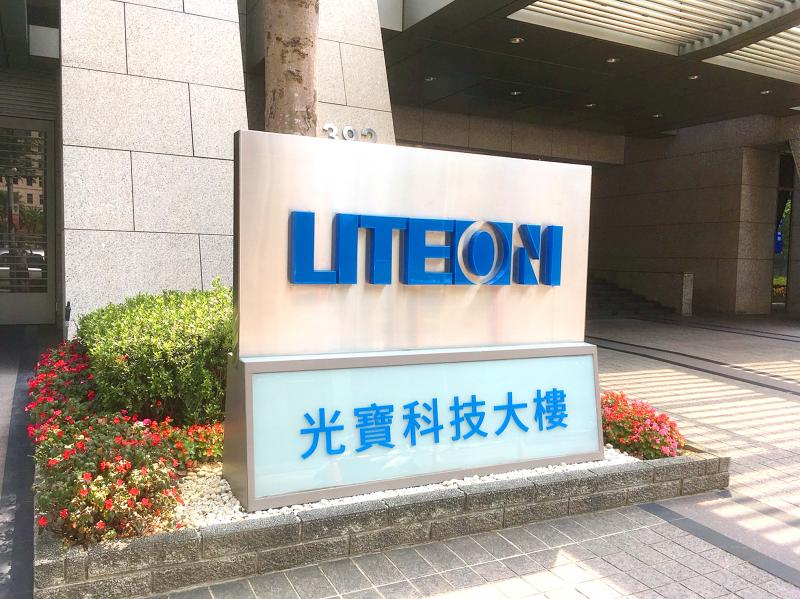Electronic components supplier Lite-On Technology Corp (光寶科技) yesterday reported consolidated revenue of NT$14.08 billion (US$496.12 million) for last month, up 4.74 percent month-on-month and 24.42 percent year-on-year.
The company said in a statement that the revenue increase reflected “stable demand” among clients for its core information technology (IT) business, while other business segments, such as optoelectronics, also showed positive growth.
Lite-On said that its information technology unit — which accounted for 55 percent of sales last month — saw revenue increase 20 percent on the back of continued strong demand for power supplies for notebook computers and gaming devices.

Photo: Chen Rou-chen, Taipei Times
The company’s power management solutions are also used in tablets, 5G communications and artificial intelligence of things (AIoT) applications.
Lite-On’s optoelectronics unit — which contributed 20 percent to sales last month and includes LED components, lighting products, camera modules and automotive electronics — reported a 20 percent annual increase in revenue, the company said.
“The ongoing demand for LED components due to industrial automation, 5G and AIoT applications, coupled with LED vehicle lighting, supported the optoelectronics unit’s growth,” the company said in the statement.
Its cloud and AIoT business, such as high-end servers and networking power management systems for cloud computing, contributed 25 percent to total sales, the company said.
This unit saw sales grow approximately 30 percent year-on-year last month, it said.
Separately, Delta Electronics Co (台達電), the nation’s leading power and thermal solutions provider, yesterday reported consolidated revenue of NT$25.12 billion for last month, down 6.7 percent month-on-month, but up 29.92 percent year-on-year.
The company attributed the annual growth in sales to robust demand for power electronics used in notebook computers and gaming devices.
In addition, electronic components, such as passive components that are applied in portable devices and cloud computing equipment, as well as products used in industrial automation, contributed to the sales increase from a year earlier, Delta said.

SEEKING CLARITY: Washington should not adopt measures that create uncertainties for ‘existing semiconductor investments,’ TSMC said referring to its US$165 billion in the US Taiwan Semiconductor Manufacturing Co (TSMC, 台積電) told the US that any future tariffs on Taiwanese semiconductors could reduce demand for chips and derail its pledge to increase its investment in Arizona. “New import restrictions could jeopardize current US leadership in the competitive technology industry and create uncertainties for many committed semiconductor capital projects in the US, including TSMC Arizona’s significant investment plan in Phoenix,” the chipmaker wrote in a letter to the US Department of Commerce. TSMC issued the warning in response to a solicitation for comments by the department on a possible tariff on semiconductor imports by US President Donald Trump’s

‘FAILED EXPORT CONTROLS’: Jensen Huang said that Washington should maximize the speed of AI diffusion, because not doing so would give competitors an advantage Nvidia Corp cofounder and chief executive officer Jensen Huang (黃仁勳) yesterday criticized the US government’s restrictions on exports of artificial intelligence (AI) chips to China, saying that the policy was a failure and would only spur China to accelerate AI development. The export controls gave China the spirit, motivation and government support to accelerate AI development, Huang told reporters at the Computex trade show in Taipei. The competition in China is already intense, given its strong software capabilities, extensive technology ecosystems and work efficiency, he said. “All in all, the export controls were a failure. The facts would suggest it,” he said. “The US

The government has launched a three-pronged strategy to attract local and international talent, aiming to position Taiwan as a new global hub following Nvidia Corp’s announcement that it has chosen Taipei as the site of its Taiwan headquarters. Nvidia cofounder and CEO Jensen Huang (黃仁勳) on Monday last week announced during his keynote speech at the Computex trade show in Taipei that the Nvidia Constellation, the company’s planned Taiwan headquarters, would be located in the Beitou-Shilin Technology Park (北投士林科技園區) in Taipei. Huang’s decision to establish a base in Taiwan is “primarily due to Taiwan’s talent pool and its strength in the semiconductor

French President Emmanuel Macron has expressed gratitude to Hon Hai Precision Industry Co (鴻海精密) for its plan to invest approximately 250 million euros (US$278 million) in a joint venture in France focused on the semiconductor and space industries. On his official X account on Tuesday, Macron thanked Hon Hai, also known globally as Foxconn Technology Group (富士康科技集團), for its investment projects announced at Choose France, a flagship economic summit held on Monday to attract foreign investment. In the post, Macron included a GIF displaying the national flag of the Republic of China (Taiwan), as he did for other foreign investors, including China-based